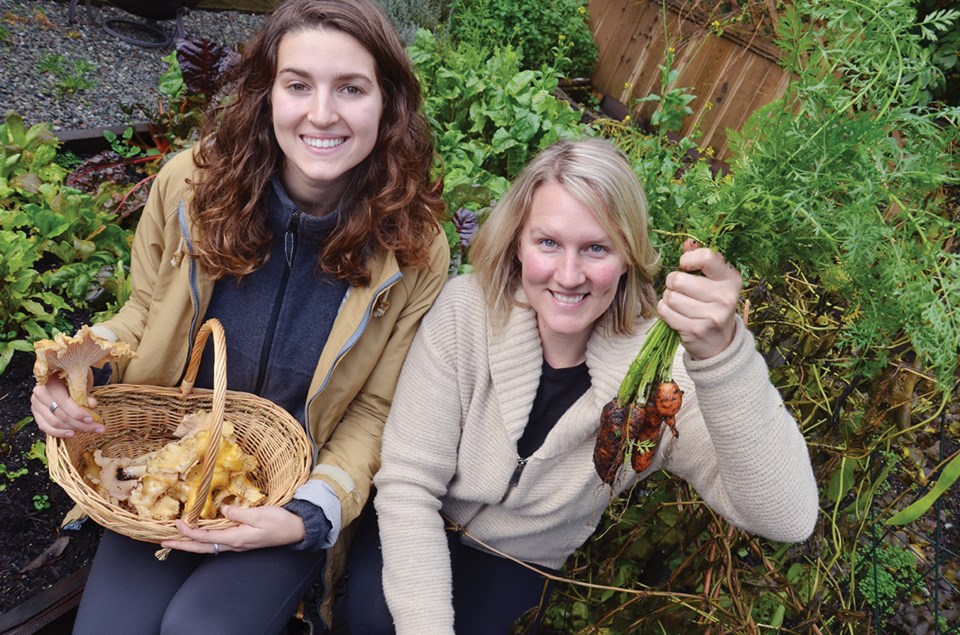Krystle tenBrink and Michalina Hunter are biting into a massive undertaking.
Backed by a $50,000 BC Real Estate Foundation grant and with support from the Vancouver Coastal Health Smart Fund, the Squamish Climate Action Network (CAN) director and president, respectively, are examining how to weave food policy into the fabric of the community.
“Food policy… those two words encompass a lot of moving parts,” tenBrink says as she sits down to a bowl of Indian food, having returned from forging for mushrooms in the woods with Hunter. “Education is one of the most important pieces.”
The undertaking started five years ago, when Squamish CAN members pieced together the first draft of a Squamish Food Charter. The aim of the charter is to serve as a declaration of the community to protect and promote a healthy, just and ecologically resilient food system. After meeting with 40 different stakeholders to compile the document, the charter was endorsed by the District of Squamish in 2015. Last November, the Squamish Food Policy Council was developed to further incorporate food-relative initiatives and thinking into municipal vision, policies and bylaws. TenBrink and Hunter, who also work as Squamish CAN staff to advance food policy, sit on that think-tank.
“It is an exciting time to talk about food,” tenBrink says, noting people are starting to understand that how we produce our food and what we eat has far-reaching effects beyond the table. Food policy impacts the local economy, health of community and individual and climate change, tenBrink notes.
“With the food policy council itself, what we are trying to do is to remove barriers that exist for our food system,” tenBrink says.
The timing of the creation of the council aligns with Squamish’s official community plan (OCP) update, Hunter notes. The duo aims to draft visionary directives that can be implemented into the community plan that helps dictate public policy. The municipality has already made some steps that address food security, such as allowing bees and hens to be kept in people’s backyards, Hunter adds. Officials have also cutting red tape to allow for backyard greenhouses to be built in more zones, she notes.
“We have been working very closely with planners,” Hunter says, adding councillors such as Karen Elliott are also very involved and they have been in touch with an official of the Ministry of Agriculture.
The food council is examining eight areas – policy, supporting farmers, infrastructure, education, food waste, preserving existing agricultural land, public awareness and how to share their experience. Tackling the wants and needs of Squamish’s existing farmers and new farmers coming to the area is a big component, tenBrink says.
“We are looking at how we make Squamish an attractive place for farmers if the existing farmers are not supported,” she notes.
“We estimate that less than two per cent of the community’s food is grown here,” Hunter says, adding that does not include Pemberton.
Land affordability and access to ongoing local retail space are two barriers, they both agree. One possible answer to promoting local produce is an agricultural hub. Hunter’s vision involves the two-acre municipal lot between O’Siyam Pavilion Park and the Mamquam Blind Channel. Modelled after Vancouver’s Sole Food Farm, the centre would include year-round space for people to sell food and goods. The hub would include some community growing plots, a storage facility and a greenhouse. A greenhouse in downtown Squamish could extend the growing season for people living in pockets of the community that lose a lot of their sunlight in the winter months, tenBrink notes.
“The one thing I love about the agriculture hub is it not only meets the need of one food issue, but several,” tenBrink says.
There’s a lot of work to be done, both admit. While it’s a giant subject, which includes access to food and how it fits into Squamish’s diverse socio-economic fabric, tenBrink and Hunter say they are able to draw upon other communities’ successes. They are excited to see it all play out.
“People in Squamish have energy and passion for working to grow food or connect with people that are growing food,” tenBrink says. ”It would be great to see our food system strengthen, more resilient and self-sufficient.”
If you want to learn more about the food council and the overall initiative visit the Squamish CAN website at squamishcan.net. You can sign-up for a newsletter or email Squamish CAN to get involved.
Tackling food waste - meet the mayor for breakfast
Join Mayor Patricia Heintzman for a discussion over a tasty breakfast that will be made entirely from imperfect food on Friday, Nov. 25, from 7:45 to 9 a.m. at the Squamish Public Library.



